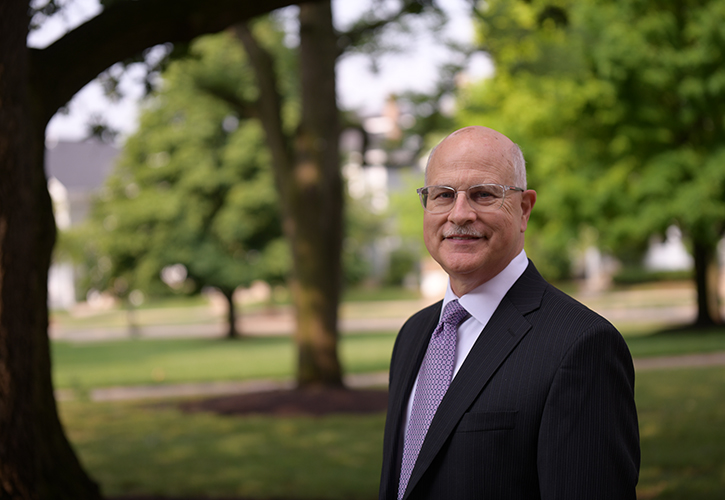College of Arts and Sciences Newsroom

Microbiologist Fred Tenover ’76 joins UD faculty, with focus on faith and science
By Dave Larsen
Fred Tenover ’76 first learned the importance of integrating faith and science as a University of Dayton student, working in the biology lab of the late Br. Don Geiger, S.M., whose science was entwined with his Catholic faith and Marianist charism.
“That model has stuck with me for a long time,” said Tenover, who joined UD’s adjunct faculty in February as a distinguished research professor of microbiology.
Tenover retired earlier this year as vice president of scientific affairs at the molecular diagnostic testing company Cepheid. Previously, he was director of the Centers for Disease Control and Prevention's Office of Antimicrobial Resistance.
Tenover said his Catholic faith is fundamental to his science. He attended a Marianist high school in Michigan before coming to UD, where he received a bachelor’s degree in biology and chemistry. He holds master’s and doctoral degrees in medical microbiology from the University of Rochester in New York.
His goal at UD is to build a culture that integrates science and religion. He is working with several faculty members to create a series of symposia and seminars on faith and science, tentatively starting in the 2024 spring semester.
“Earlier this year, I gave a guest lecture in a microbiology course for Dr. Yvonne Sun,” Tenover said. “It was really about career pathways, reflecting on some of the things I had done, but also about my research. I talked about the fact that for me, faith and science are synergistic — there’s no conflict — and that people shouldn’t be afraid to integrate their own faith into their pursuits of science.
“The critiques of my lecture were very interesting, because many of the students said they were inspired by that and they wanted to hear more about that.”
Tenover hopes the series will continue for a number of years. His collaborators include Karolyn Hansen, Department of Biology chair; Jana Bennett, Department of Religious Studies chair; and Sandra Yocum, University Professor of Faith and Culture.
“Fred brings a wealth of experience as a scientist who has worked in government, academic and private sector settings,” Yocum said. “These experiences have confirmed his commitment to faith as integral to the scientific project. We want to engage UD students and faculty in exploring how faith and science can and do work together. Such a project is located at the heart of Catholic intellectual traditions and fits very well with my work as University Professor of Faith and Culture.”
Drawing on his decades of research on antibiotic resistance, Tenover also is working with faculty and staff from the Roesch Library and Department of Biology to create a website devoted to antimicrobial resistance issues.
This initiative also was inspired by a seminal experience from his first year as a UD student. In 1973, famed science fiction writer Isaac Asimov gave a guest lecture at UD’s Kennedy Union ballroom. Azimov, a biochemistry professor at the Boston University School of Medicine, told students they lived in a technological age, in which many people were fearful of technology. He said if you understand technology, you have a moral obligation to teach those who don’t.
“That hit me really strongly and very favorably,” Tenover said. “So, a lot of my career has really been built around being that translator of science, either to other scientists, to the lay public or, especially in my job developing molecular diagnostic tests for infectious diseases, translating molecular biology for physicians.”
Tenover has carried that challenge with him throughout his career. Twenty-five years later, he met Asimov at a science meeting where the latter was the speaker.
“I found myself at a reception standing next to him, so I told him how much of an impact that lecture had on my life. He just smiled and he said, ‘I’m glad.’”
Tenover is on the executive committee of the International Society for Antimicrobial Chemotherapy. He is developing teaching tools for laboratories in low- and middle-income countries to improve testing for antimicrobial resistance, with the goal of improving how antibiotics are used globally. He hopes to get UD students involved in research and projects such as the website, which he envisions as a repository for all things related to antimicrobial research.
“I'm really excited about the collaboration between Dr. Tenover and the libraries,” said Carissa Krane, professor of biology and College of Arts and Sciences associate dean for faculty affairs and research. “As an internationally recognized expert in microbiology, the materials and resources made available in the ‘Antimicrobial Resistance’ site will include articles, videos, PowerPoint lectures and other publications from Dr. Tenover and others, that will be of interest to students, faculty and investigators around the world.”
Tenover was honored with the University of Dayton’s 2016 Distinguished Alumni Award. In recent years, he served on the College of Arts and Sciences Advisory Council, as a consulting professor of biology and as a strategic advisor to UD’s Integrative Science and Engineering Center.
“Fred’s support for the College as an alumnus, advisor and mentor to our faculty and students has been a tremendous asset,” said Danielle Poe, College dean. “We are pleased to welcome him to our faculty and we look forward to the continued impact of his teaching and research, as well as his exciting new initiatives related to faith and science, and antimicrobial resistance.”
For more information, visit the Department of Biology website.
